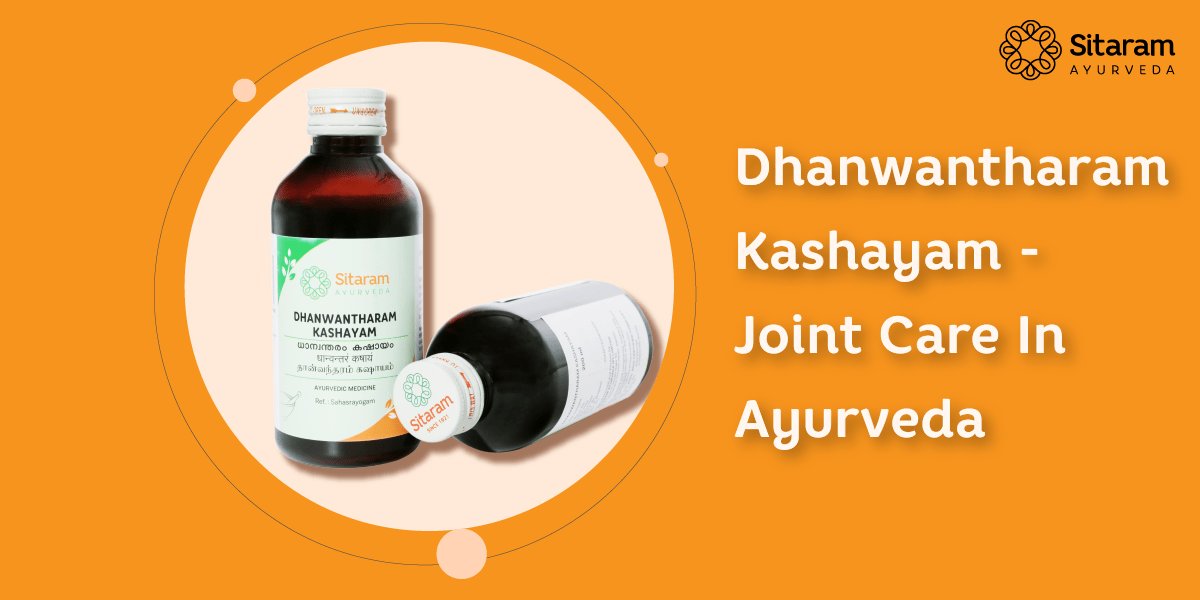Dhanwantharam Kashayam – Joint care in Ayurveda

What is a joint?
A joint is the part of the body where two or more bones meet.
Joint diseases
Diseases or injuries affecting the joints are joint diseases.
Arthritis is the best-known one, but there are many others too.
Types of joint diseases are the following
a) Osteoarthritis
Osteoarthritis is the most common type of arthritis. Osteoarthritis affects millions of people worldwide and is one of the leading causes of morbidity, especially in older people.
Cause of Osteoarthritis
Osteoarthritis occurs when the protective cartilage at the end of bones wears down.
Signs and Symptoms
- The pain of the affected joint
- Joint stiffness
- Tenderness
- Loss of flexibility
- Swelling of the joint
- The crackling sound of the joint
b) Rheumatoid Arthritis
Rheumatoid arthritis (RA) is an inflammatory, autoimmune disease affecting the joints. RA usually affects the lining of the joints.
Cause of RA
RA occurs when your immune system mistakenly attacks your body tissues.
Signs and symptoms
- Pain over joints (small joints are usually affected)
- Stiffness of joints
- Swelling over joints
- Fatigue
- Fever
- Loss of appetite
c) Spondyloarthritis
Spondyloarthritis is a type of arthritis. It attacks the spine, joints, skin, intestines, and eyes.
Types of spondyloarthritis
- Ankylosing spondylitis: It affects joints and ligaments of the spine.
- Reactive arthritis: refers to any joint pain triggered by an infection in another part of the body.
- Psoriatic arthritis: People who have the skin disease psoriasis get this type of arthritis.
d) Juvenile Idiopathic Arthritis
It is the most common type of arthritis in children.
Signs and symptoms
- Pain
- Swelling
- Stiffness
- Fever
- Rash
- Swollen lymph nodes
e) Gout
Gout is characterized by sudden, severe pain, swelling, redness, tenderness in one or more joints. Gout occurs most often in the big toe.
Cause
When our body has extra uric acid, sharp crystals form in the big toe or other joints. These deposits causes episodes of swelling and pain.
Signs and symptoms
- The intense pain of the affected joint.
- Redness
- Swelling
- Stiffness
- Tenderness
- Warmth
f) Bursitis
Bursa is fluid-filled slippery sacs that facilitate the gliding motion of joints. Bursitis occurs when these bursae get inflamed. An example is retrocalcaneal bursitis causing heel pain.
g) Joint Injuries
Common joint injuries include sprains, strains, fractures, and dislocations.
Dhanwantharam Kashayam
The formulation, Dhanwantharam Kashayam, is an innovative preparation using the drugs of Dhanwantharam Tailam (medicated oil) explained in the Ayurveda classical text Ashtangahrudaya. The drugs of the above Tailam made into a decoction.
Primary ingredients of Dhanwantharam Kashayam
Bala (Sida cordifolia)
Studies show that the plant possesses antioxidant, anti-inflammatory, analgesic, antimicrobial properties.
Yava (Hordeum vulgare)
Yava has high nutritional value. In addition, it possesses a laxative effect, diuretic activity, cholesterol-reducing effect, and anti-diabetic effect.
Dasamoolam
Dasamoolam contains roots of ten plants. They are
- Bilva (Aegle marmelos)
- Agnimantha (Premna serratifolia)Shyonakam (Oroxylum indicum)
- Patala (Stereospermum suaveolens)
- Gambhari (Gmelina arborea)
- Brihati (Solanum indicum)
- Kantakari (Solanum xanthocarpum)
- Shalaparni (Desmodium gangeticum)
- Prishniparni (Uraria picta)
- Gokshura (Tribulus terrestris)
Pharmacological actions
Dasamoola is an anti-inflammatory, anti-arthritic, analgesic, antispasmodic, adaptogenic, antioxidant, neuroprotective, uterine tonic, etc.
Ashwagandha (Withania somnifera)
The pharmacological activities of Aswagandha include antimicrobial, anticancer, immunomodulatory, neuroprotective, stress-relieving activities.
Madhuka (Glycyrrhiza glabra)
This plant shows antimicrobial, antioxidant, anti-inflammatory, antitussive, antiviral, antiulcer, hepatoprotective, and antiallergic properties.
Shathavari(Asparagus racemosus)
Pharmacological activities include galactagogue effect, antisecretory, antiulcer, antitussive, adaptogenic, antibacterial, hepatoprotective, and cardiovascular activities.
Triphala
Triphala contains fruits of three plants Hareethaki (Terminalia chebula), Vibheethaki (Terminalia bellirica), and Amalaki (Emblica officinalis).
Triphala shows laxative, antioxidant, anti-inflammatory, immunomodulatory, antibacterial, antimutagenic properties.
Dhanwantharam Kashayam and joint diseases
- The formulation is an excellent analgesic. Thus it helps to reduce joint pain.
- Dhanwantharam Kashayam, along with a suitable adjuvant, helps to reduce joint stiffness.
- The medicine possesses anti-inflammatory properties. Thus it helps to reduce joint inflammation.
- Intake of Dhanwantharam Kashayam is good in muscle injuries.
- The formulation is used extensively in acute joint injuries.
- Many of the ingredients in Dhanwatharam Kashayam shows an antioxidant property.
Other benefits of Dhanwantharam Kashayam
- Effective in post-partum care
- Nervine tonic
- Improves muscle strength
- Effective in psychological disorders
- Good in gynaecological disorders
- Effective in urinary incontinence
Available forms
Dhanwantharam Kashayam is available in three forms
- Dhanwantharam Kashaya Choornam (powder -form)
- Dhanwantharam Kashaya Gulika (tablet -form)
- Dhanwantharam Kashayam (Prepared decoction)
Dose
Kashaya Choornam
Adults- Boil 50 gm of powder in 400 ml of water and reduce to 200 ml. Take 100 ml twice daily.
Children- 50 ml twice daily
Tablets
Adults- one to two tablets twice daily
Children- 1/2 tablet twice daily
Kashayam
Adults can take 15ml Kashayam mixed with 30 ml lukewarm water
Children can take 5 ml Kashayam mixed with 10 ml lukewarm water
Ideal for taking before food.
Adjuvant
Ksheerabala (101 A)/ Sahacharadi Sevyam are the most prescribed adjuvant.
Side effects
No side effects for Dhanwantharam Kashayam noted to date. However, it is better to avoid during pregnancy.
One should take medicine under strict medical supervision.
Dhanwantharam Kashayam is a beautiful medicine for all forms of joint diseases and traumatic joint conditions. In addition, it is an excellent muscle and nervine tonic. Dhanwantharam Kashayam is an overall bone, muscle, and joint protector.
To Buy Ayurvedic Joint Care Medicine from Sitaram:


 Sign In
Sign In Cart
Cart